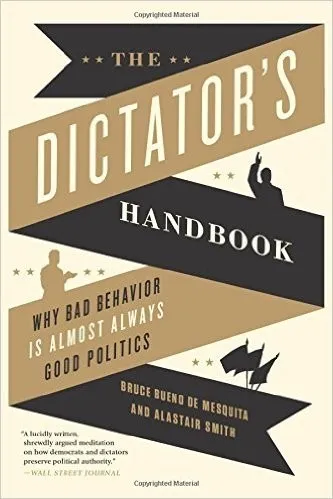
This list is curated from 1 mentions and sorted by most mentioned, then by date of most recent mention. The more a book is mentioned, the more likely it's recommended and a favorite!

This list is curated from 1 mentions and sorted by most mentioned, then by date of most recent mention. The more a book is mentioned, the more likely it's recommended and a favorite!
This book examines positions of power (e.g. country leadership, mayors, CEOs, deans, etc.) by assuming entirely self-interested actors who seek to gain and retain power, and argues through examples that this relatively simple model gives the first order explanation of many world events. If you really grasp the message you'll adopt a much more cynical world view, but you'll also stop torturing yourself over stupid questions like what a country "ought" to do, what is "right", or why the people in power just can't see it. At the same time, spending some time in reality will reveal ways of remedying various suboptimal situations (e.g. the inefficacy of foreign aid) with solutions that recognize the root cause and manipulate incentive structures of those in power. The book supplements its thesis with various examples. For instance, resource-rich autocracies with small winning coalitions tend to oppress the population, which is irrelevant to the revenue needed to retain power. Conversely, there exists a curious tension in countries that cannot extract riches from the ground and instead rely on a productive population to generate wealth. This leads to the development of technologies that empower people, such as better communication networks, transportation infrastructure, education, etc., but these in turn pose a threat to those in power. There is also an element of "survival of the fittest" to systems with small winning coalitions, where even if a benevolent leader rises to power who wants to raise the standard of living for the masses, they are likely to become replaced by those who promise to redirect that wealth to the key supporters (e.g. those in charge of the police, military, treasury, etc.). A coup is significantly easier if these institutions turn a blind eye. The outlooks are somewhat better for an average person living in a democracy, because the incentives of the ruler are aligned with making the average person better off to win a re-election. In short, to understand the dynamics of a system of power the first order features to consider are 1) the nominal electorate (people who theoretically have influence), or the "interchangeables", 2) the real selectorate (the people who actually have the influence), or the "influentials" and 3) the winning coalition (the number of people required to keep power), or the "essentials". You can then solve for the dynamics. My main critique of the book is that it is simply too damn long, too repetitive, and badly in need of an experienced editor. You'll hear the same statements re-iterated ad nauseam, and in many cases you'll wish the author was more concrete instead of arguing in generalities, at a level where the abstraction washes out the complexity and makes the conclusions self-evident under the simple model. Therefore, I'd recommend that the reader selectively skips through the book, or watch CGPGrey's summary video ( https://www.youtube.com/watch?v=rStL7...), or the EconTalk podcasts featuring the author (e.g. http://www.econtalk.org/archives/_fea...). 3/5View source